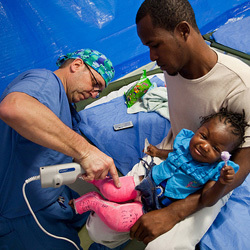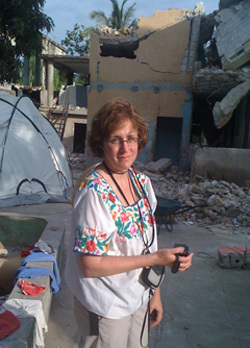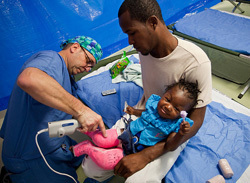

Three Notre Dame Science alumni participated in a panel discussion, “From ND Labs on Campus to Life in the Real World: How Notre Dame Scientists are Making a Difference,” on June 1, during Alumni Reunion Weekend. The Eck Institute for Global Health sponsored the gathering, moderated by Mary Ann McDowell, a member of the institute and an associate professor of biological sciences.
Participants were Dr. Kevin Olehnik (’78), Chief of Surgery at Penobscot Bay Medical Center in Rockport, Maine; Dr. Mary Oconnor (’83), an internist and pediatrician at Everett Clinic in Seattle, Wash.; and Dr. Michael C. Dugan, (’83), chief medical officer at bioTheranostics Inc. in San Diego, Calif.
“Doing something in the global health field has always been part of my passion, purpose and drive,” said Oconnor, who started going on optometric mission trips to Honduras with her father when she was growing up and is still taking graduate global health classes as well as working in Haiti and El Salvador. “Notre Dame’s been a large part of that. I think I have a personal obligation to continue my learning. I think part of our obligation as an educational group is to try to educate others on what are the projects that deserve time and attention and resources.”
Oconnor and Olehnik have made frequent trips to Haiti, recruited by professor emeritus Emil Hofman. “Those trips did give me the ability to do those three things I wanted–service, paying back this place and then teaching,” Olehnik said, adding that early reflection deepened his appreciation for his Notre Dame education. “It not only gave me the academic gifts, but it gave me the moral gifts.”

Dugan, whose company develops molecular diagnostic tests, said health problems vary from country to country, and people need tools as well as education to address and prevent disease. Among other things, automated diagnostic technology, such as high throughput systems, can help reduce the cost of diagnoses.
Olehnik said understanding other cultures is a critical issue in global health. "It was amazing how we Americans want to go in and change a culture to make it our culture, do things our way,” he said. “You have to be more tactful than that–use humility, compassion, patience, flexibility. I have seen the world from a totally different perspective. It changes your life because your perspective changes.”